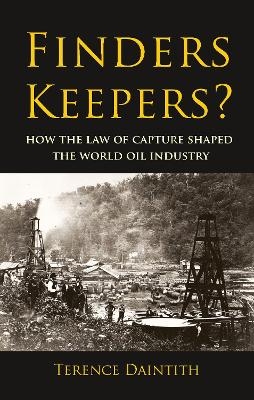
Finders Keepers?
Resources for the Future Press (RFF Press) (Verlag)
978-1-933115-84-9 (ISBN)
Since the beginnings of the oil industry, production activity has been governed by the 'law of capture,' dictating that one owns the oil recovered from one's property even if it has migrated from under neighboring land. This 'finders keepers' principle has been excoriated by foreign critics as a 'law of the jungle' and identified by American commentators as the root cause of the enormous waste of oil and gas resulting from US production methods in the first half of the twentieth century. Yet while in almost every other country the law of capture is today of marginal significance, it continues in full vigour in the United States, with potentially wasteful results.
In this richly documented account, Terence Daintith adopts a historical and comparative perspective to show how legal rules, technical knowledge (or the lack of it) and political ideas combined to shape attitudes and behavior in the business of oil production, leading to the original adoption of the law of capture, its consolidation in the United States, and its marginalization elsewhere.
Terence Daintith is the former director of the University of London's Institute of Advanced Legal Studies. He is a visiting professor at the University of Western Australia and at the University of Melbourne Law School, and is co-editor of the standard treatise on United Kingdom oil and gas law.
Preface and Acknowledgments
Part I: The Beginnings of the Rule of Capture in the United States
1. Naming and Blaming
2. The Leading Cases and their Legal Background
3. Practice and Belief in the Early Petroleum Industry
Part II: Alternatives and Parallels
4. The Mineral Water Industry in France: Protection and Competition
5. Asphalt in Trinidad: Digging your Neighbour's Pitch
6. America's Early Oil Rivals: Petroleum and Property Rights in Galicia, Romania and Russia
Part III: Modified Capture: The United States in the 20th Century
7. Correlative Rights and the Beginnings of Conservation
8. Oil and Gas in the Public Lands
9. Conservation Regulation and the Institutionalization of Capture
Part IV: Evading Capture?
10. Securing Unified National Control of Petroleum Resources
11. Capture Revivified? Competitive Acreage Allocation by Governments
12. The Cross-Boundary Petroleum Deposit as a Federal and International Issue
Part V: Conclusion
13. The Least Worst Property Rule?
References
| Erscheint lt. Verlag | 31.8.2010 |
|---|---|
| Verlagsort | Washington |
| Sprache | englisch |
| Maße | 152 x 229 mm |
| Gewicht | 1120 g |
| Themenwelt | Geschichte ► Teilgebiete der Geschichte ► Militärgeschichte |
| Geschichte ► Teilgebiete der Geschichte ► Wirtschaftsgeschichte | |
| Recht / Steuern ► EU / Internationales Recht | |
| Recht / Steuern ► Öffentliches Recht ► Umweltrecht | |
| Recht / Steuern ► Rechtsgeschichte | |
| Technik ► Elektrotechnik / Energietechnik | |
| ISBN-10 | 1-933115-84-X / 193311584X |
| ISBN-13 | 978-1-933115-84-9 / 9781933115849 |
| Zustand | Neuware |
| Haben Sie eine Frage zum Produkt? |
aus dem Bereich


